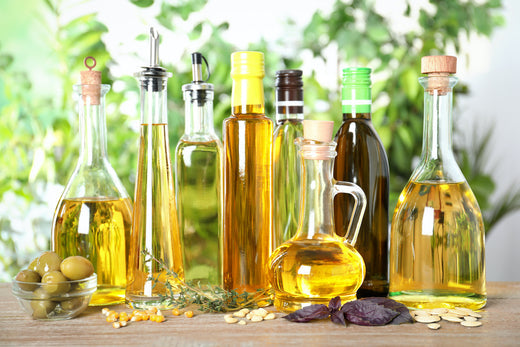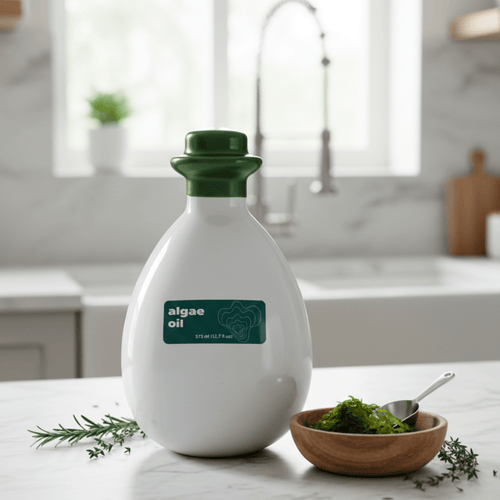Oils often get a bad reputation, simply because many of us don’t know enough about the health benefits of each of them. The thing is – no two oils are the same! While too much oil can be harmful for our organ function and body weight, too little oil means we’re missing out on healthy fats and essential nutrients.
It’s also important to know when to use different oils, as some are great raw and untampered with (perhaps poured straight over salad!), while others are great for cooking and can be used at high temperatures. 
Oils are a staple in the kitchen, not only to help assist with cooking meats and vegetables, but oils can really liven up a dish when used in their raw form. From the Mediterranean diet’s love for olive oil, to our modern obsession with avocados and coconuts, this guide deciphers what oils we should be eating, and where and how we should be using them. What are the healthiest oils? Keep reading to get the rundown.
Healthy Oils and Fats 101
Before we get into oils, we need to cover the facts about fats. Not all fats are the same, much like not all oils are the same. Here’s what to look out for when you’re deciding which oils you’d like to use.
Unsaturated Fats
Unsaturated fats are heart healthy fats recommended by the American Heart Association. Ideally, we should be consuming the majority of fats from this source, as they’re known to improve blood cholesterol and ease inflammation, amongst other benefits. Foods containing polyunsaturated fats are also a great source of omega-6 and omega-3 fatty acids.
What kinds of oils contain unsaturated fats? Oils made from vegetables, nuts, or seeds, such as olive, walnut, among others.
Saturated Fats
While saturated fats have historically been considered “bad,” in recent years new research has emerged that suggest that small amounts of saturated fats from natural sources such as avocados and coconut oil can be a healthy part of a balanced diet. That being said, saturated fats are still a divisive topic, with some people touting their health benefits, while others deem them unhealthy. Because the jury is still out on saturated fats and the evidence is inconclusive, it’s best to follow the advice of your own personal health professionals, and what works best for your body.
What kinds of oils contain saturated fats? Coconut oil, cocoa butter, butter, or shortening.
Trans Fats
It’s best to avoid these fats as much as possible, as they can raise your cholesterol. Artificial trans fats (as opposed to naturally occurring or ruminant trans fats found in dairy and meat) are found in processed or hydrogenated oils, which are then made into things such as vegetable shortening, which is chemically altered to stay solid at room temperature.
What kinds of oils contain trans fat? Vegetable oils and margarines.
Seven Of The Best Oils To Go With Food

1. Avocado Oil
Benefits: A great oil to use for heart health, avocados may help reduce the risks of stroke and heart attacks by helping maintain a healthy cardiovascular system. The monounsaturated fats that are found in avocados are helpful for cholesterol and are also a great brain food (our brains need fat to work well!).
When to use: With a really high smoke point of 520°F, avocado oil is a great choice for stir-frying or roasting vegetables.
Try it in this recipe: Healthy Avocado Brownies
Shop it here: Avocado Coconut Oil Blend 
2. Extra Virgin Olive Oil
Benefits: Extra virgin olive oil is rich in antioxidants and Vitamin E and is popular because of its versatility. ‘Extra virgin’ simply means that the oil hasn’t been extracted from the olives using heat or chemicals.
When to use: EVOO can safely be used to cook with as it has a smoke point of between 374 and 405°F.
Try it in this recipe: Garlic Green Spaghetti
Check out all of our olive oil recipes here.
3. Coconut Oil
Benefits: Coconut oil has become extremely popular in recent years, but some medical professionals aren’t yet on board with eating saturated fats. Needless to say, it’s a much-loved oil for people doing the keto diet, due to the fact that fatty acids may encourage the brain to burn fat. It’s also filled with HDL, which is considered good cholesterol.
When to use: The smoke point of coconut oil is slightly lower than some of the other oils listed here, at 350°F, but it’s still a really stable oil to use for cooking. It can replace butter at a 1:1 ratio.
Try it in this recipe: Infused Golden Milk or use it with our Gummy Mix Trio kit
Shop it here: Organic Coconut Oil

Check out all of our coconut oil recipes here.
4. MCT Oil
Benefits: Medium-chain triglyceride (MCT) oil is generally made from coconut or palm kernel oil, and is used because of the body’s ability to absorb it into the bloodstream easier than other oils. The main use is for weight loss and as an energy booster. Learn how to infuse MCT oil here.
When to use: Best used in smoothies and hot drinks, or drizzled on a salad dressing. To get the most benefit from this oil, don’t cook with it.
Try it in this recipe: Hot Apple Cider or use it with our Gummy Mix Trio kit
Shop it here: Premium MCT Oil
5. Walnut Oil
Benefits: Walnut oil has a wide range of benefits, and is a wonderful, nutrient-dense oil to drizzle over food in its raw form. The compounds ALA, LA and polyphenols have been found to potentially lower blood pressure, plus the omega-3’s in the oil may help nourish skin and decrease inflammation in the body.
When to use: Walnut oil has a low smoke point at 320°F, so it’s best to use this oil when it’s raw, or infused at a lower temperature.
Make your own: Activated Walnut Oil
6. Grapeseed Oil
Benefits: A byproduct of the wine industry, grape seeds are processed to make grapeseed oil. Rich in omega-6 fatty acids and vitamin E, grapeseed oil is widely considered to be a neutral oil in terms of flavor and scent. That means it's great if you don’t want to distract from the flavors of the dish you’re making.
When to use: As grapeseed oil has such a high smoke point of between 420 - 445F, it’s a really versatile oil for cooking at medium and high-heat temperatures.
Try it in this recipe: Essential Oil Rollerballs
7. Canola Oil
Benefits: Canola oil contains a mix of omega-3 and omega-6 fatty acids and vitamins E and K, making it a healthy oil option. That being said, if you’re actively avoiding trans fats, canola oil can contain small amounts, so it’s best to stay clear.
When to use: With a high smoke point of 400°F, canola oil is a great choice for frying or cooking foods.
Try it in this recipe: Infused Pumpkin Coconut Curry
Oils & Fats To Avoid
We already know that trans fats aren't the best for our health, but what other oils should we avoid? Not all plant-based oils are good for you. Healthline notes that when oils are too high in omega-6, they can increase your chances of obesity, heart disease, arthritis, diabetes, and cancer.
With that in mind, it's best to intake oils high in omega-6, such as sunflower oil, palm oil, sesame oil, corn oil, cottonseed oil, peanut oil, and rice bran oil, in moderation.
How To Take Care Of Your Oils
Here’s how to keep your oils flavorful and long-lasting.

- Store in a cool, dry place. Oils can go rancid if they’re exposed to heat, so it’s best to store them in a cupboard.
- Keep note of the best before date on the bottle of oil, and make sure you use it within 12 months.
- Don’t reuse or reheat your oil after cooking with it.
- Oils such as grapeseed and walnut oil should be stored in the refrigerator. With all oils, it’s best to look at the manufacturer’s storage instructions.
- Storing oils in dark glass can help stop light and heat getting in and damaging the oil.
Looking for a healthy oil starter pack? Check out our Oil Trio Bundle.
What are your favorite oils to use? We’d love to hear how you use your go-to oils. Tag us using @LEVO_Oil and #LEVOmade to share your creations.





























Leave a comment
All comments are moderated before being published.
This site is protected by hCaptcha and the hCaptcha Privacy Policy and Terms of Service apply.